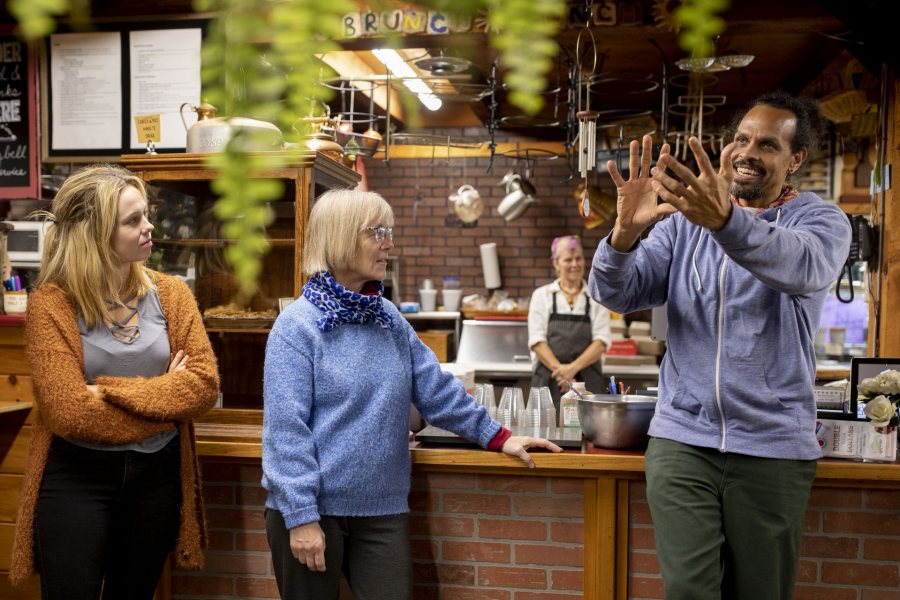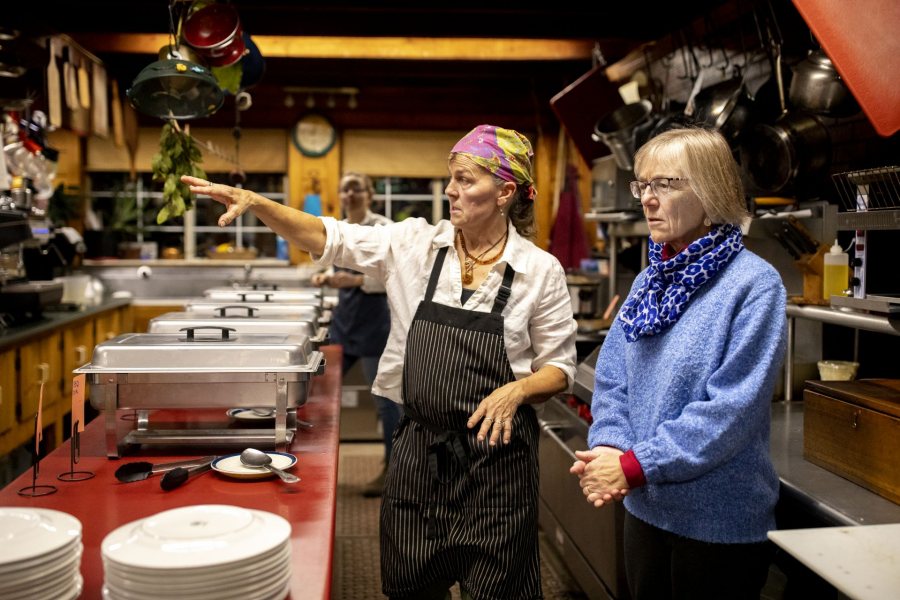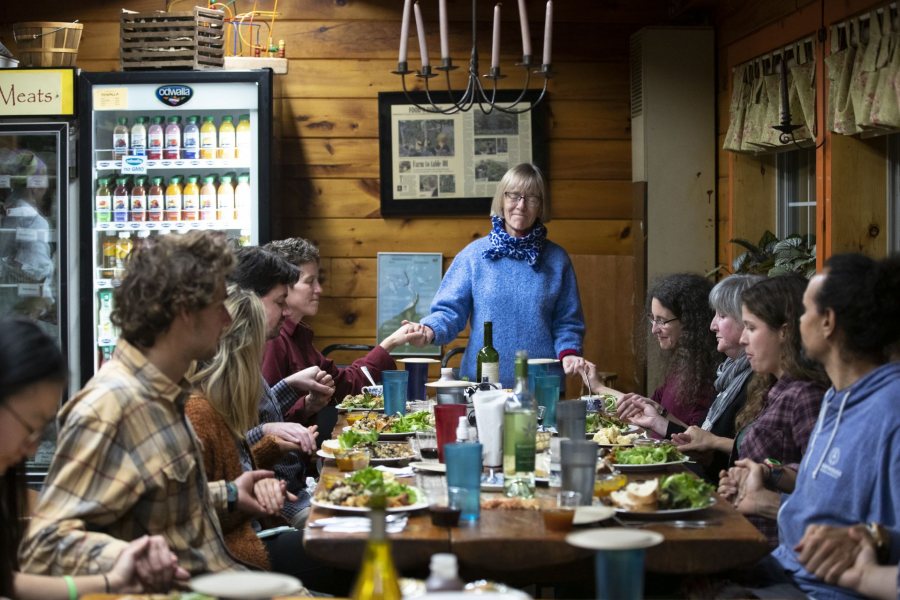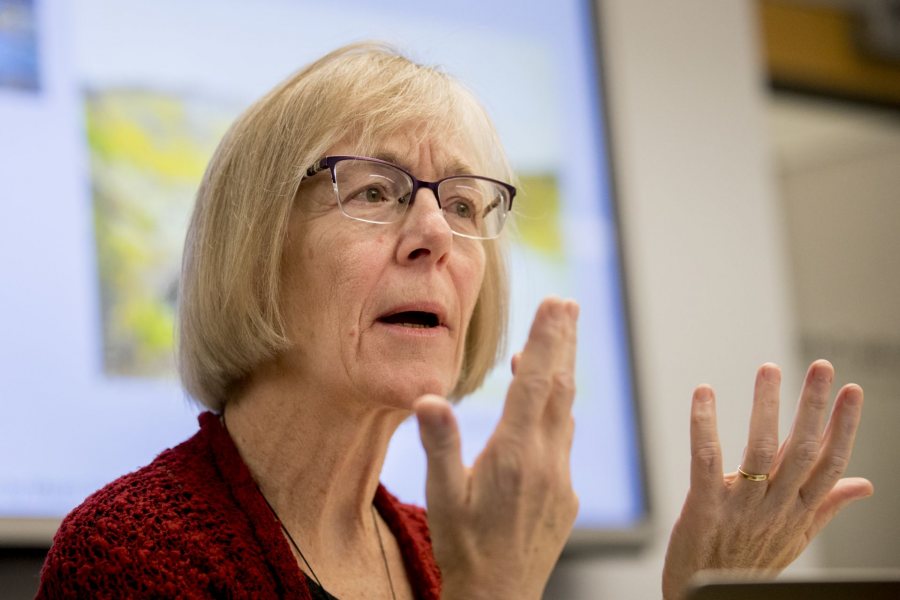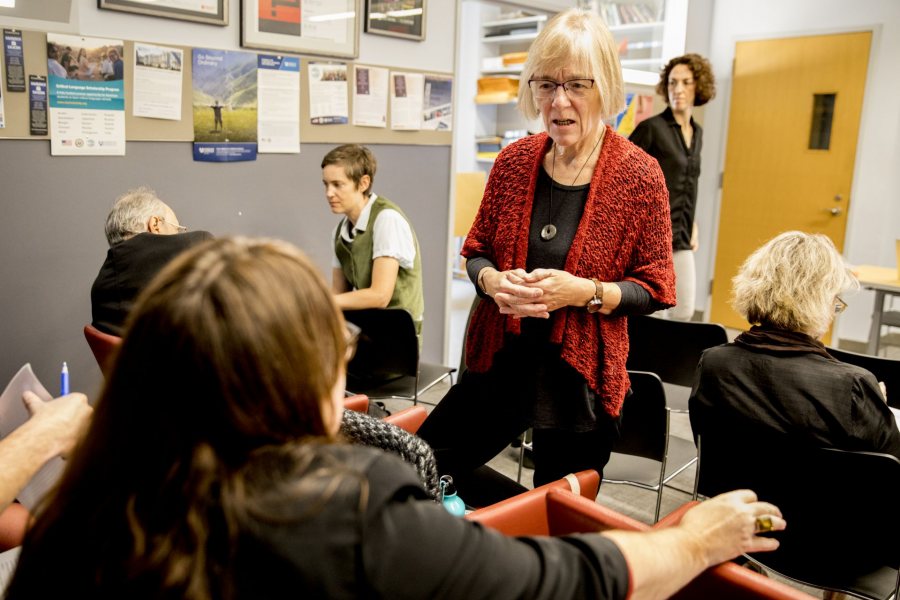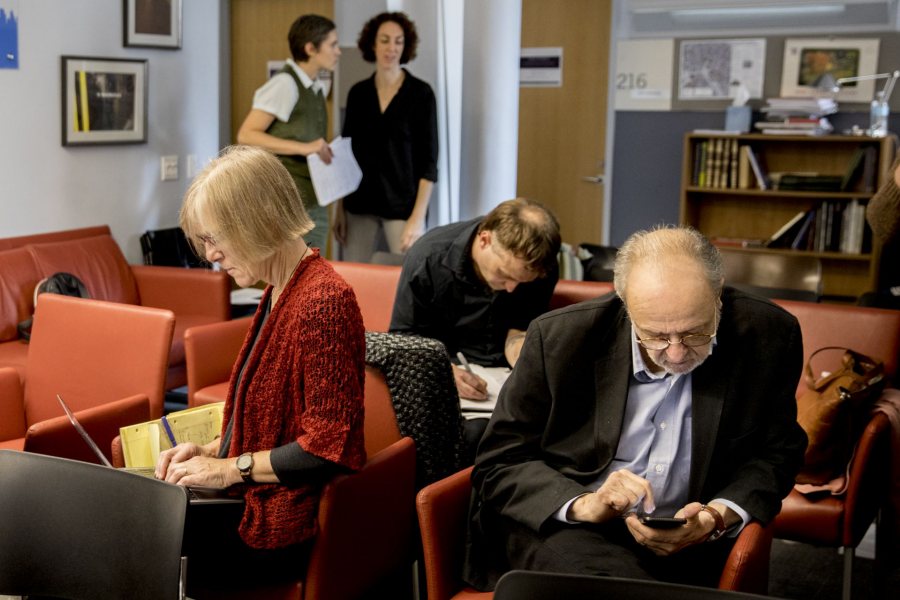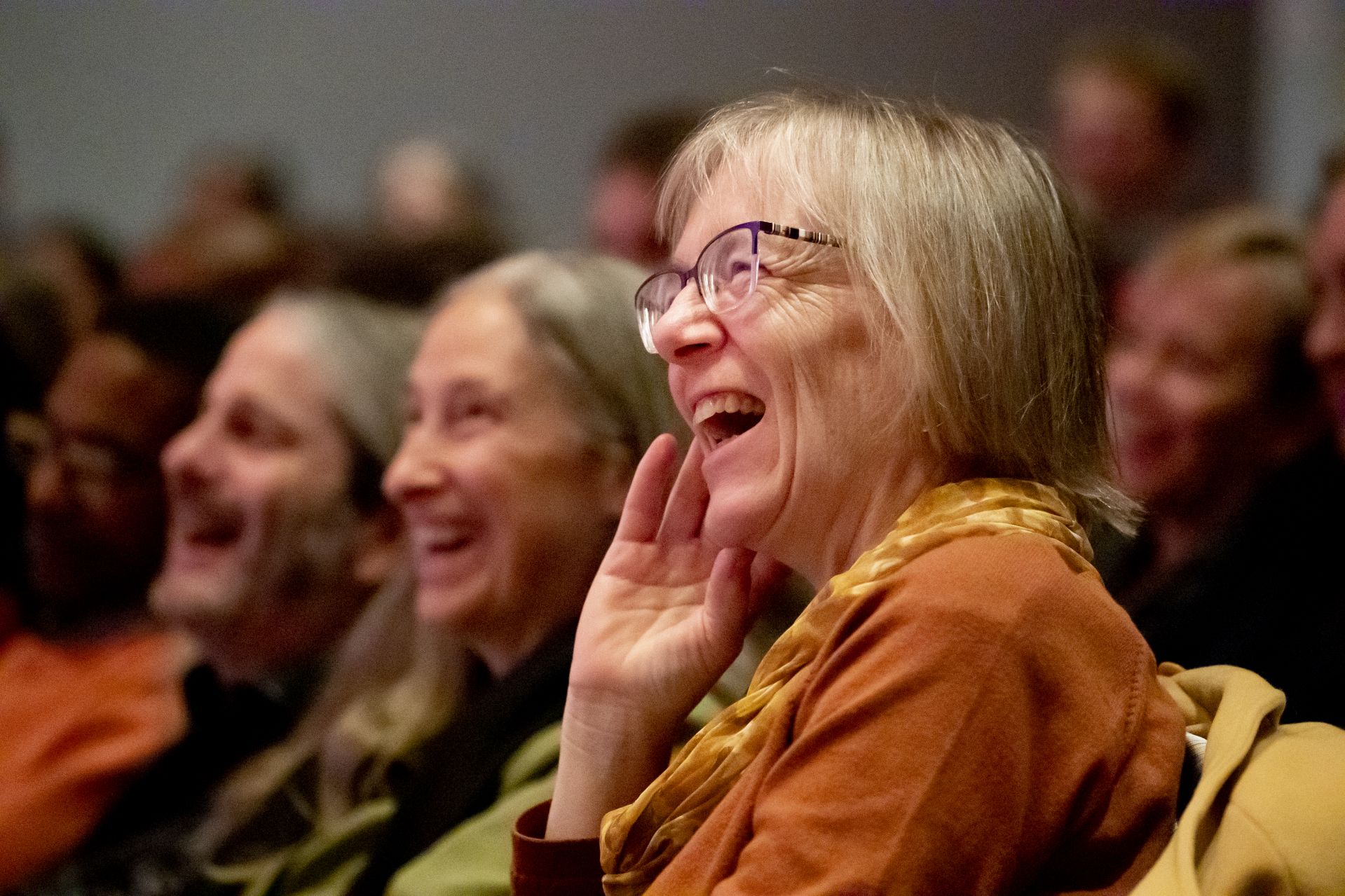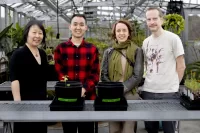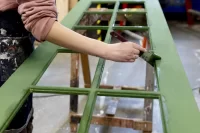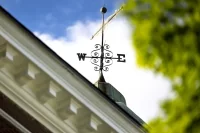
Let’s admit it: I’ve been Jane Costlow’s shadow — a Boswell to her Johnson — these last three months as I try to document her 34th and final year of teaching at Bates.
I’ve followed her onto the Quad for Opening Convocation, into Bates classrooms to see her teach, and down to Portland (and into a Trader Joe’s store) to photograph a student-led climate protest.
Little did I know that we were just getting started.
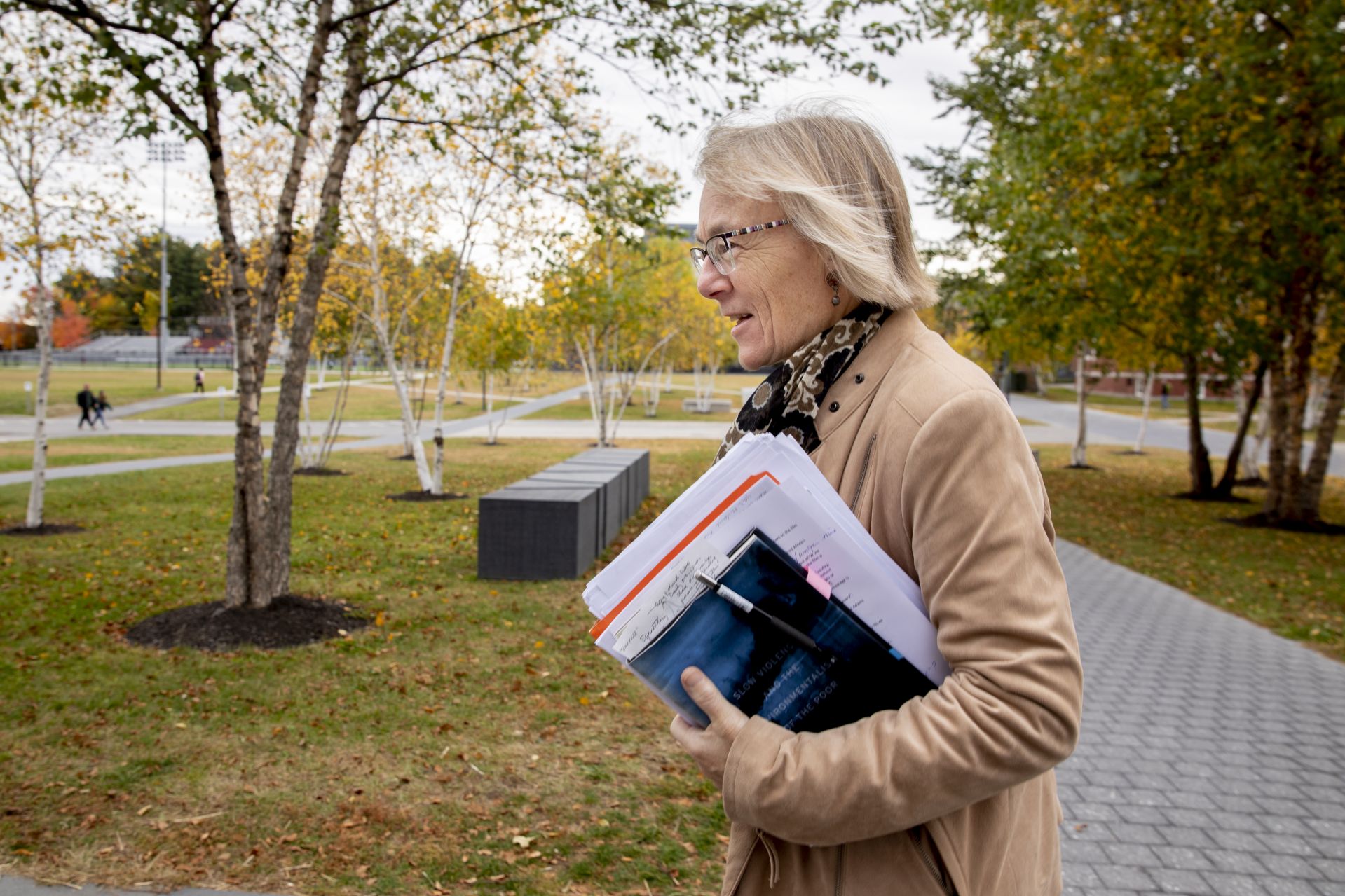
Graded papers in hand, Jane Costlow departs her Hedge Hall office to walk over to the Olin Arts Center, where she’ll teach her 9:30 a.m. course “Lives in Place.” She uses the short stroll from Hedge to Olin as a time to decompress. (Phyllis Graber Jensen/Bates College)
In late October, I rode the bus for seven hours to New York City to photograph Costlow presenting scholarly research about oil pollution in the Volga River in the late 1800s and early 1900s.
Behind me on the ride down, a woman read her poetry aloud off her laptop (aren’t they handy?) to a stranger, an all-too-willing conversational partner who compared her poems, at length, to Yeats and then to Thoreau.
At first, I had a rosy reaction to their dialogue. What great preparation, I reasoned, for entering Costlow’s academic milieu, a heady mix of literature and history and language study — until the dialogue persisted for the full seven hours, the kind of time I wouldn’t spend even on Costlow.
But was it worth it? Yes, because I got to see how Costlow, in her final year at Bates as the college’s Griffith Professor of Environmental Studies, continues to excel at teaching, research, and service, the holy trinity of faculty responsibilities by which professors across the land are judged and measured.
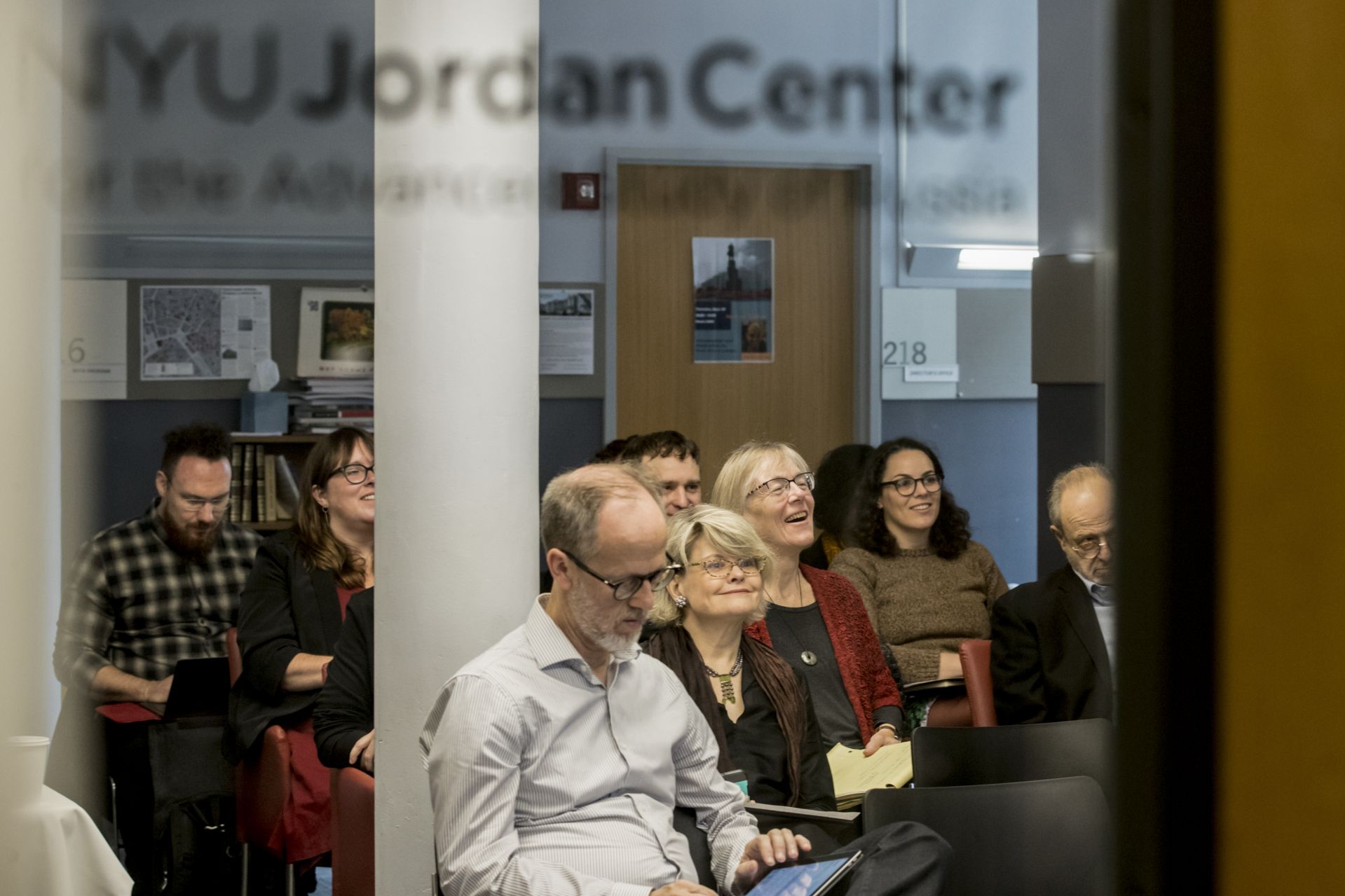
Costlow attends a one-day conference Energy Aesthetics: Force, Flow, and Entropy in Russian Culture at NYU’s Jordan Center for the Advanced Study of Russia. (Phyllis Graber Jensen/Bates College)
And over a recent three-week span, Costlow undertook all three with zeal.
On campus, she taught students and graded their papers.
In New York, she presented the paper “Seeing Oil: Transporting the Volga into the Modern Era” at the conference Energy, Aesthetics: Force, Flow, and Entropy in Russian Culture at New York University’s Jordan Center for the Advanced Study of Russia.
Costlow’s Final Year
Join us as we follow Jane Costlow — esteemed Bates teacher, scholar, and colleague — month by month during her 34th and final academic year.
And then, serving as chair of the college’s Philip J. Otis Committee, she orchestrated a three-day visit to campus in early November by poet and essayist Ross Gay, who visited classes, dined out with faculty and students, and delivered this year’s Otis Lecture.
(Squeezed into the mix, too, was Costlow offering commentary one Saturday afternoon on the documentary film Makala, screened at Lewiston Public Library for the Tournées French Film Festival.)
We spoke to Costlow about the pleasures and challenges of trying to manage all of these roles nearly simultaneously.
In American higher education, the triad of scholarship, teaching, and service defines an academic’s career. How do those expectations define what it’s like to be a faculty member at Bates?
Ideally, they all feed into, nourish, and sustain each other. At Bates, I’ve had the good fortune to teach what I really love, things that I’m intellectually and personally really interested in.
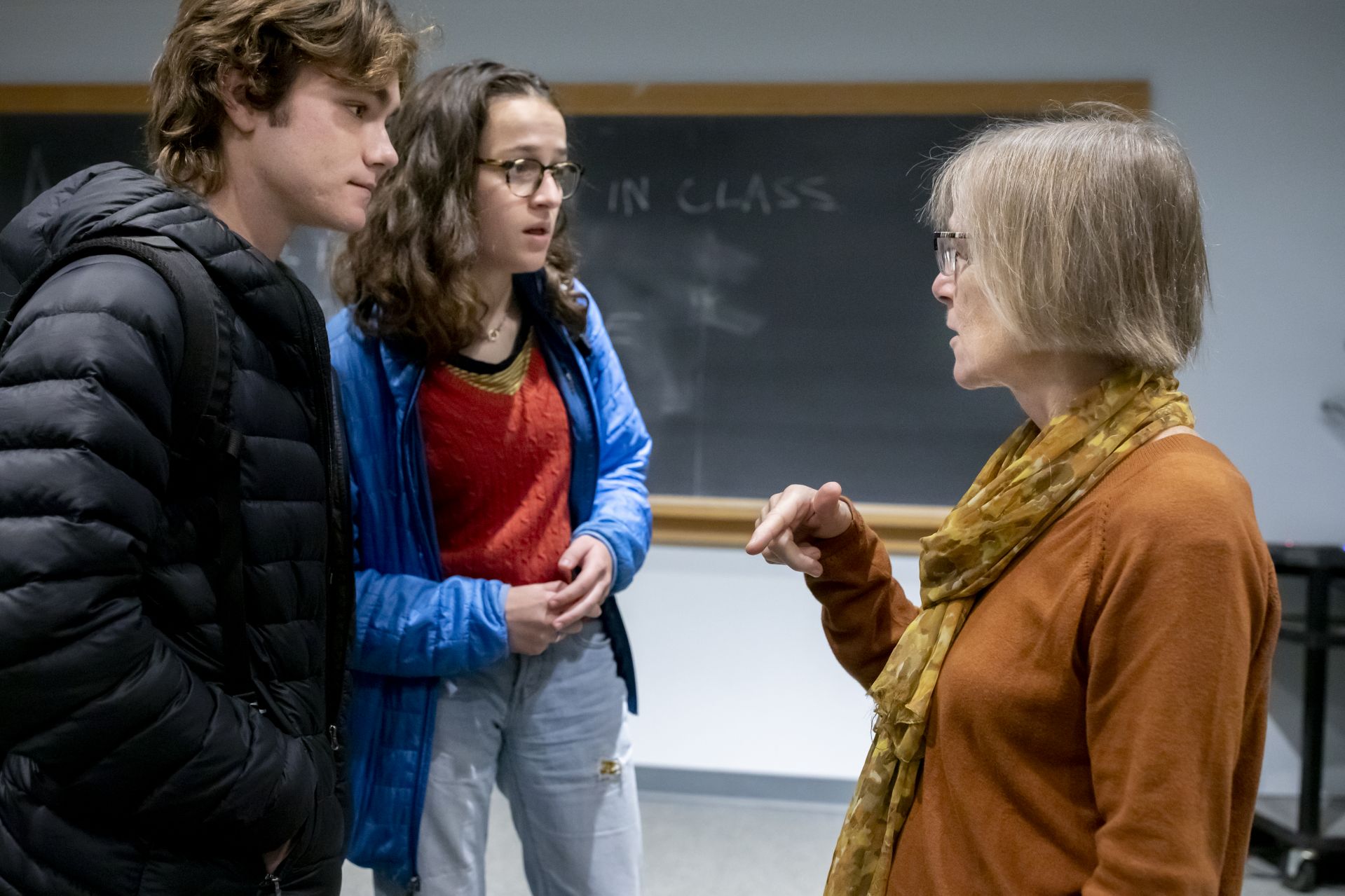
Jasper Beardslee ’22 of Miami and Elly Beckerman ’22 of Washington, D.C., students in Costlow’s “Lives in Place” course, wedge in a quick conversation with her after class. (Phyllis Graber Jensen/Bates College)
There are ways in which my teaching has led me into new kinds of scholarly questions, which is great. And there really is something about your own intellectual curiosity, and other forms of curiosity, that can be fed by your scholarship and then that comes back into the classroom.
But there’s never enough time for the scholarship that you want to do.
The service part can sometimes feel really integrated, and sometimes it’s just part of what we need to do to keep the household of Bates College going, part of what it is to be at a liberal arts college. I find that service is more likely to sap energy than necessarily nurturing energy.
You’ve mentioned that doing all three nearly simultaneously, as you did in recent weeks, is a bad idea. Why?
It’s just too much — I don’t think that’s healthy for anybody.
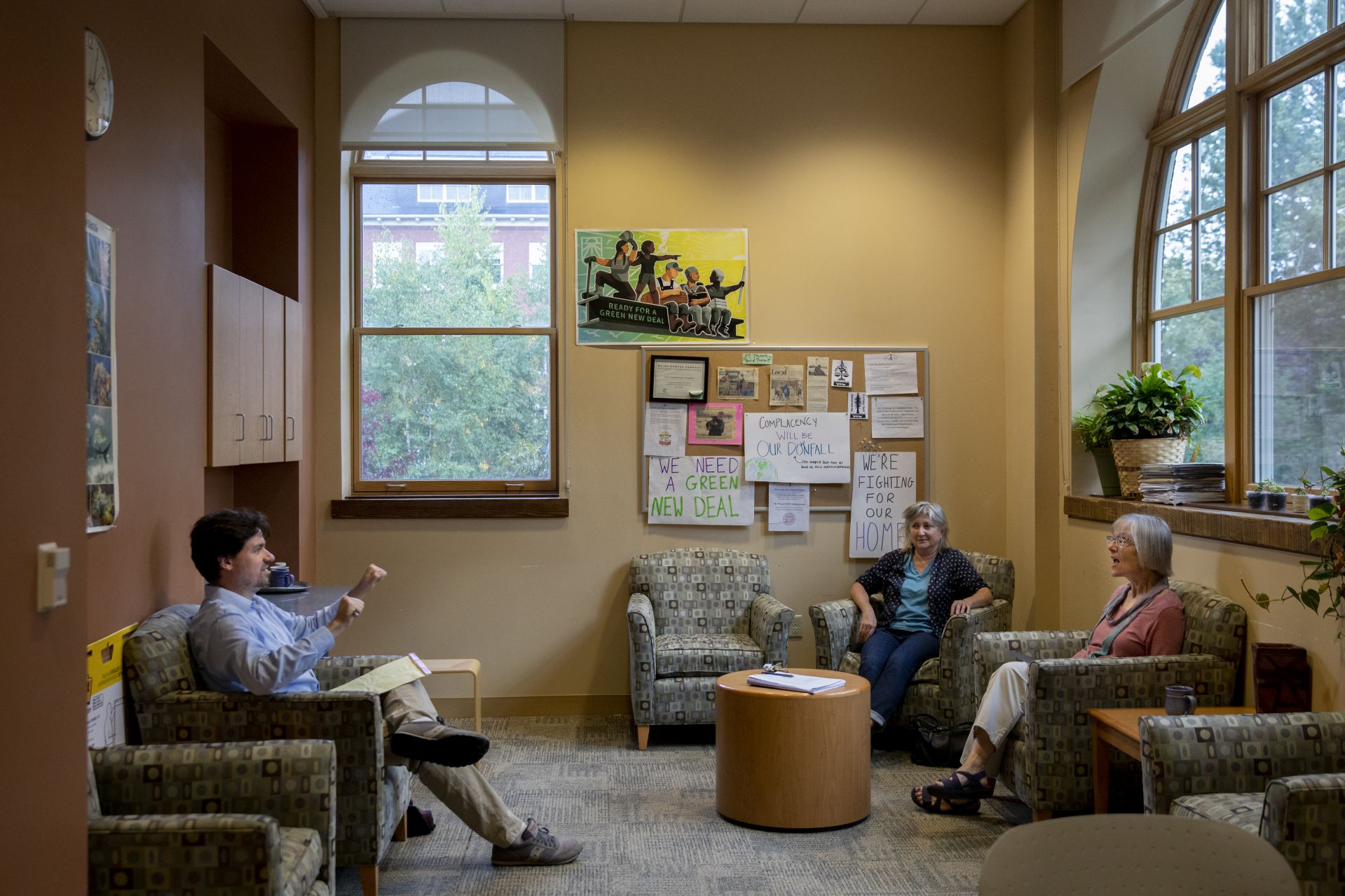
Costlow meets with members of the Otis Committee, including Assistant Professor of Philosophy Paul Schofield and Professor of English Lillian Nayder in Hedge Hall’s Environmental Studies Lounge. (Phyllis Graber Jensen/Bates College)
And it’s not just the faculty trying to keep all these balls in the air. I have a first-year student violinist who’s very excited about everything. I heard someone ask him after class, “Oh, are you going to be playing in the orchestra?” And he said, “Well, technically, I don’t have the time to play in the orchestra. But I might try to anyway.”
And I just found myself laughing because I thought, “There it is: You don’t really have enough time to do all these things, but you’re kind of ramming more things into your day.” I worry about us trying to get too much done in too little time at Bates.
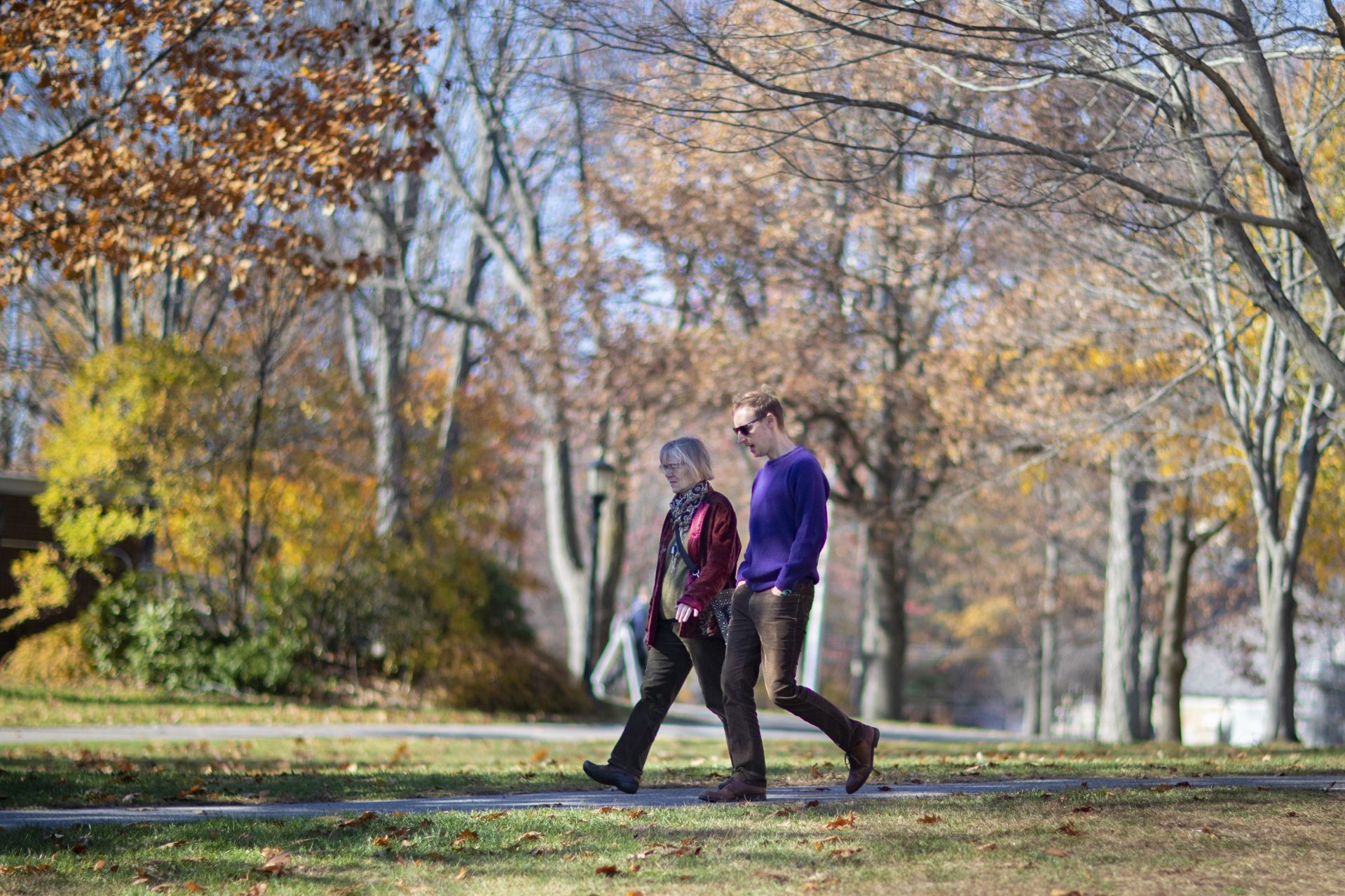
Clark A. Griffith Professor of Environmental Studies Jane Costlow and Visiting Assistant Professor of Environmental Studies Francis Eanes head to lunch.
We hear these concerns throughout American society. What might an alternative look like?
We had dinner with Ross Gay at Nezinscot Farm in Turner the other night. We do it each year: a group of faculty and students take our Otis visitor to Nezinscot for a wonderful country-farm meal. It’s just incredibly relaxed. We sit around this long table and have a sort of Thanksgiving dinner. We chat, and then at a certain point, somebody tries to ask a good question that we can all have a conversation around.
This year, we talked a lot about what an environmental studies education ought to be, about the students’ hunger for some kind of hands-on aspect to their education.
The next day, my colleague Carissa Aoki told me that on the ride back to Bates from the farm, the students talked about how wonderful it was to sit and just talk with the faculty, just to have that big, rambling, relaxed conversation, and that we don’t do it enough. And they’re absolutely right. We don’t.
At top, before dinner at Nezinscot Farm, essayist and poet Ross Gay kicks off introductions as Costlow and environmental studies major Alexandra Cullen ’20 listen. Above left, Costlow consults with host Gloria Varney, and above right, Costlow leads the group in a moment of gratitude before dinner. (Phyllis Graber Jensen/Bates College)
What’s the solution?
I don’t know. Do I need to bring in donuts and coffee to my classes? Should we sit on the floor instead of at desks? There’s something about the arrangement here — the stress and the dizziness — that gets in the way of having those deep conversations. I guess I’m thinking that we just live in a world that is not conducive to reflection. And that impacts me and it also impacts my students.
How so?
For example, to write well, you really do need space to be reflective — space to empty and clear your mind and get ready to write. Do we give our students that space for deep creative work?
In that sense, for me, writing and teaching often seem incompatible. The poet Adrienne Rich said that when she was teaching, she wasn’t actually able to write poetry. It had to do with the way that being in a classroom takes the energy out of you.
One of any teacher’s major responsibilities is grading papers. I’ve seen you running to class, papers in hand. I’ve seen you hand those papers back to eager students. Presumably this process is valuable to you as well as your students.
Teaching students how to write and responding to their writing is probably one of the most important things I do as a teacher. And it’s a big task. I have pretty large classes now, and I just can’t imagine teaching without having them write papers. I need to see their writing. I need to see their ideas developed. I need to try to help them even in the context of a fairly large class. I need to give them feedback and help them develop as writers.
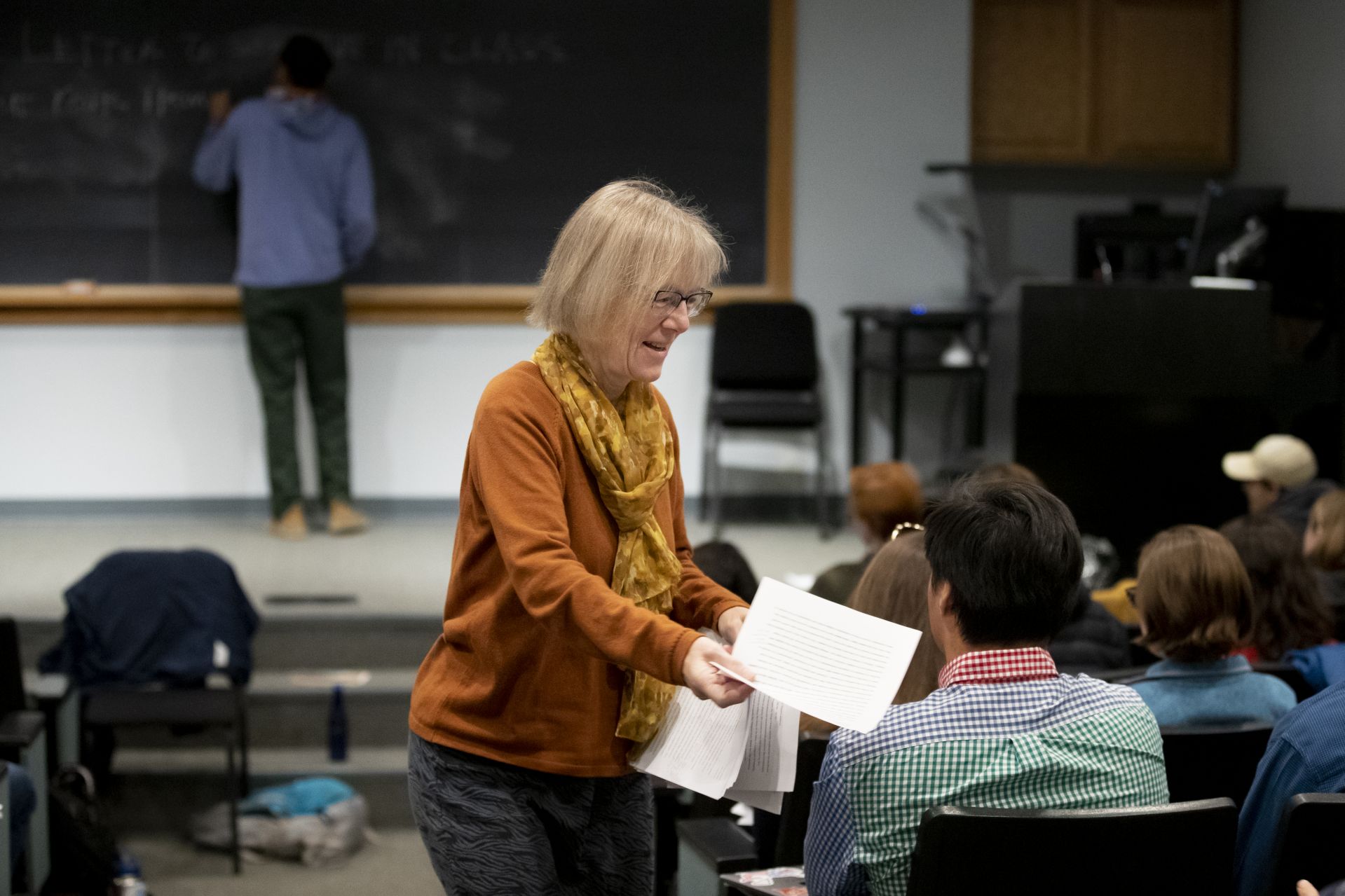
As the 2019 Otis Lecturer Ross Gay puts a writing prompt on the blackboard, Costlow hands back papers to her students. (Phyllis Graber Jensen/Bates College)
Has anything changed for you in the process of responding to your students’ writing?
I think I’ve learned a lot over the years about how to approach responding to student writing. But grading is a whole other thing: It’s really hard to know how to put a letter grade on a piece. I always hope that my responses to a student’s writing are more complicated and helpful than just the grade. But you know that students are going to look at the grade, and the grade matters.
I learned years ago from the Writing Workshop at Bates to start your remarks with something positive. I think that’s something I’ve pretty much internalized. I always try to say something supportive to a student in terms of responding to their ideas, even if something hasn’t come together very well or that there’s a really interesting idea that’s kind of buried on page four.
The other thing I’ve learned is not to get bogged down in minutiae or get lost in the weeds. Try to give some general comments that can be helpful for the development of their writing.
Jane Costlow shares her thoughts on the importance of student writing. (Phyllis Graber Jensen/Bates College)
Do your graded papers end up dripping red ink?
I don’t use red pens; I use green or purple. When I edit my own writing, I tend to have a twitchy finger: I circle a lot and make lots of marks. I try not to do that too much on a piece of student writing because everything that I’ve learned about student writing says that while the mechanics of the paper — the grammar and the like — are important, it’s a lower-order importance. You have to try to look at the overall organization: the structure and the ideas.
I continue to learn from student papers, a new take on something that I’ve been reading or a movie that we’ve been watching for a really long time. That’s exciting. Then you can also really tell when a student is engaged in what they’re writing about. It’s hard to put a name to it, but there’s this intangible feeling in the tone of the paper that you can recognize.
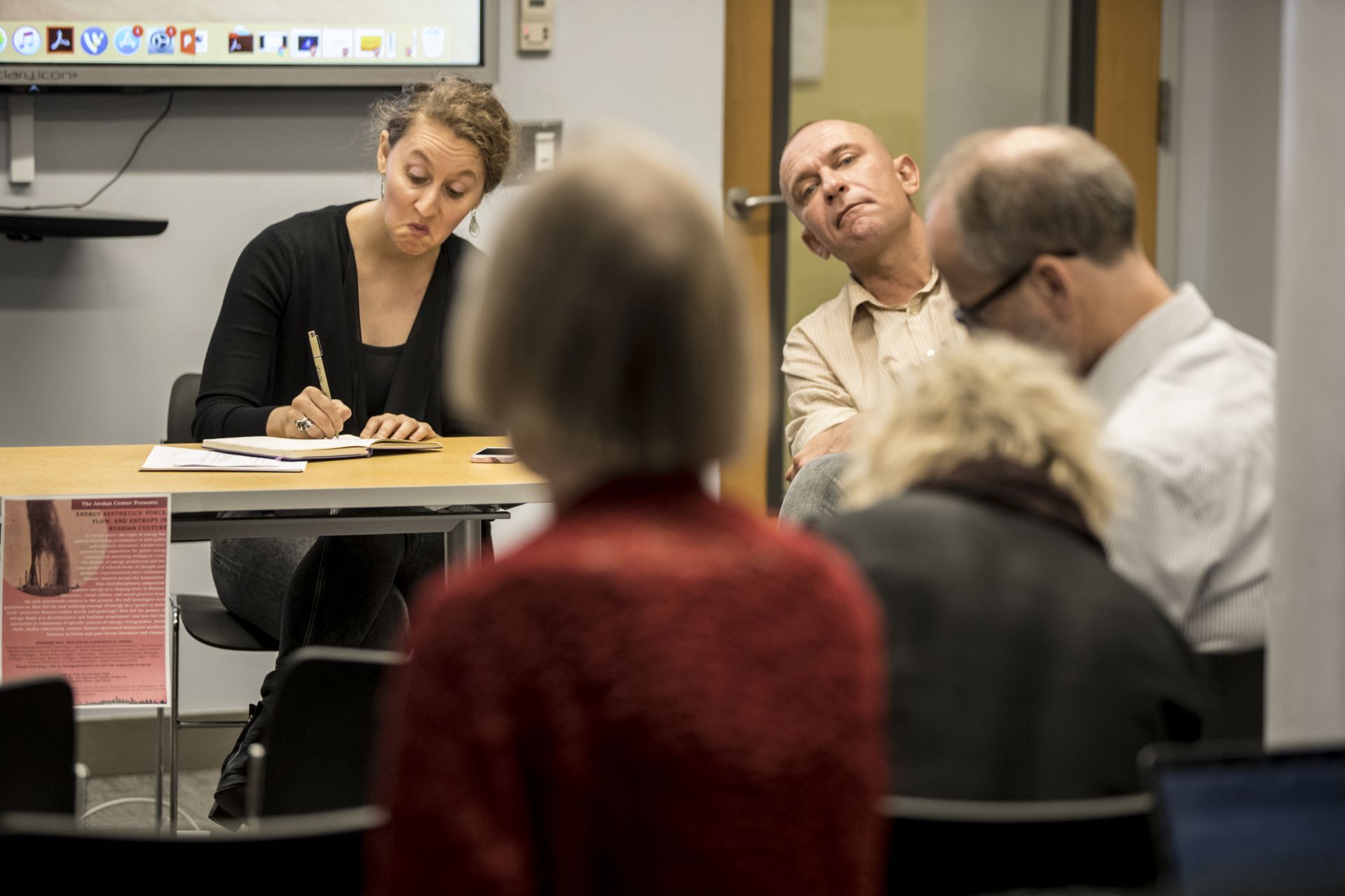
Maya Vinokour, assistant professor in the Department of Russian and Slavic Studies at NYU, takes note of a response made by Costlow after Vinokour’s presentation. Konstantine Klioutchkine of Pomona College is at right. (Phyllis Graber Jensen/Bates College)
At the NYU conference, I saw you respond to the other scholars’ papers, and it seemed that they accepted your comments with appreciation and respect. People eagerly engaged with you after your own presentation. I saw you reconnect with contemporary colleagues and reach out to younger ones. What did that feel like?
That was a wonderful workshop because it was a relatively small, focused, and interactive gathering of scholars. We were all interested in similar issues, but it wasn’t such a narrow focus that it felt like we were all talking about the same thing all day long. I like that kind of conference, where it’s more intimate and you can actually have sustained conversations with people over the course of a day.
We have a shared language. We all speak Russian. But we also share a deep love for some of the same texts and have similar kinds of questions about Russian culture.
At top, Costlow presents her paper at NYU’s Jordan Center. Above left, Costlow receives feedback on her paper from a colleague. Above right, conference participants take a break before lunch. (Phyllis Graber Jensen/Bates College)
That day in particular was incredibly helpful because I’d been working on this paper all summer and was super into it. Then the semester began, and I had to basically say, “Okay, all those files have to go down on the floor, because the student papers have to come on to the desk.”
That meant that I was significantly overdue with the paper — it was commissioned for a volume of essays written mostly by environmental historians — and I didn’t know where I wanted to go with it. So, the comments that I got from people at the workshop were just amazing and really helpful.
So the image of the isolated scholar isn’t always an accurate one.
Yes, it’s a reminder that in the best situations, our work can be involved in dialogue with each other. And so as much as I like kind of going and closing the door of my study and doing a deep dive into the material, there’s something about being in conversation with other people. That’s actually true of my students as well as other colleagues, where I can get to that “ah-ha” moment and figure out my way through a writing project. That’s kind of cool.
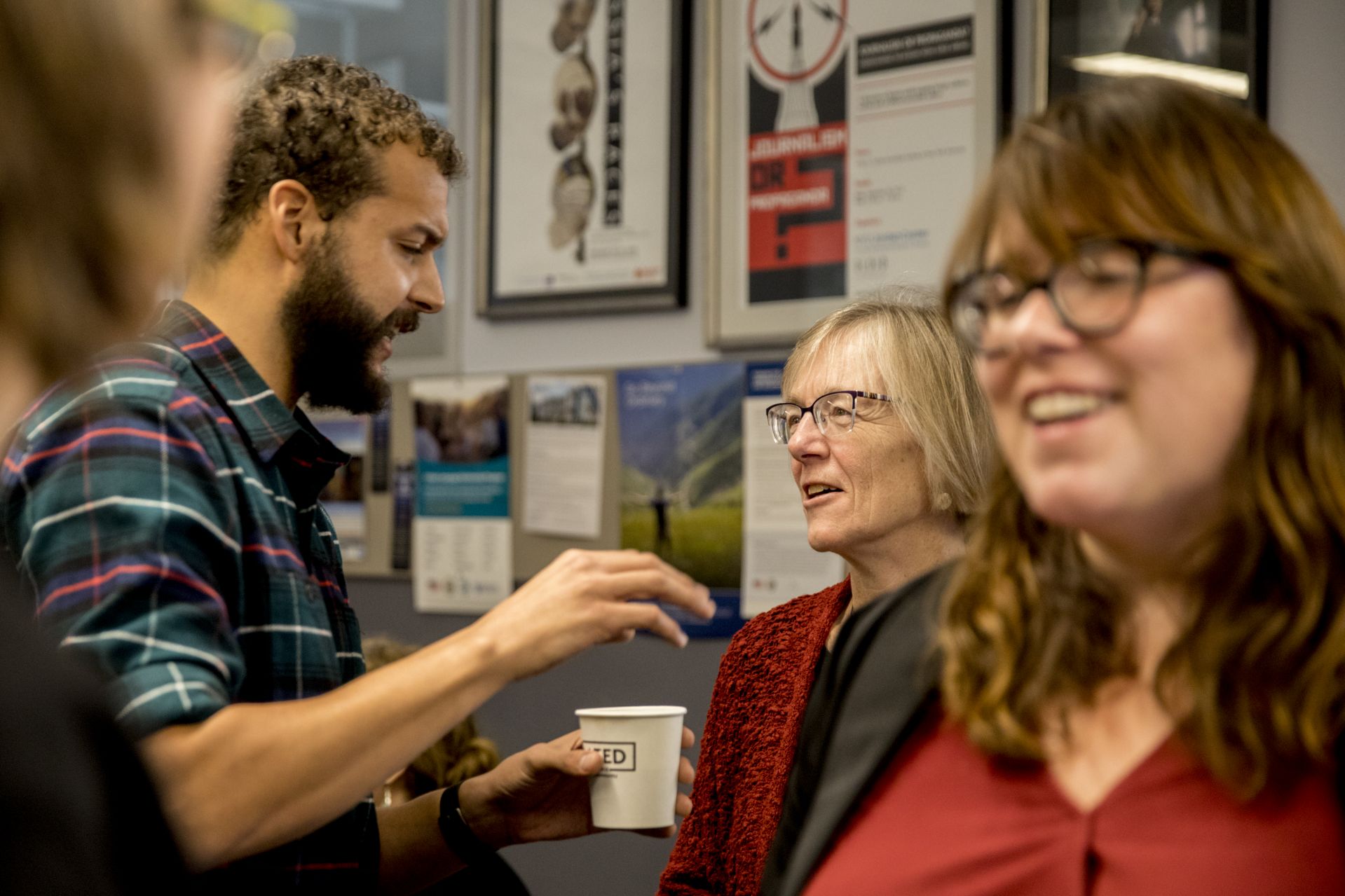
After the conference’s morning session, Tyler Harper, a doctoral candidate in the NYU Department of Comparative Literature, speaks with Costlow. (Phyllis Graber Jensen/Bates College)
Looping in your other New York City experience, tell us about your Saturday morning breakfast with your friend and colleague Ellen Chances at the Utopia Diner on the Upper West Side.
Ellen is a professor of Russian literature at Princeton. She’s from Lewiston, and her mother taught piano in Lewiston and at Bates for years — Natasha was a very beloved teacher, and taught my daughter piano. Ellen’s father, Ralph Chances, was in the Bates economics department for years, though I unfortunately never got to know him.
Ellen and I have become really close friends. We share a love of Russian literature, but we share lots of other things as well, and we actually have regular telephone conversations. Whenever I go to New York, we have breakfast at the Utopia Diner. It’s always energizing and heartwarming to see her.
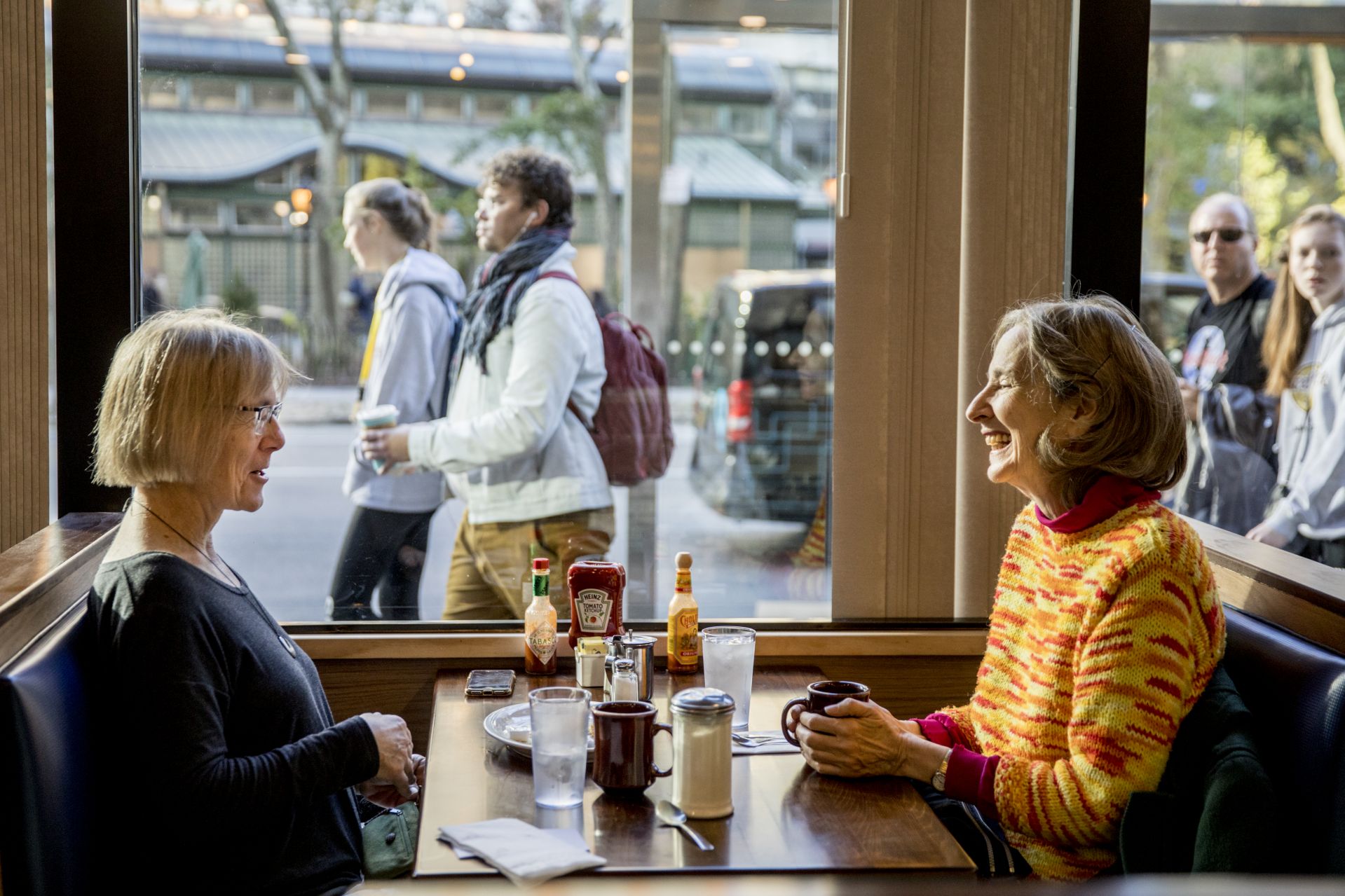
Costlow has breakfast at the Utopia Diner with her longtime friend Ellen Chances, professor of Russian literature at Princeton University. (Phyllis Graber Jensen/Bates College)
Back to the question of a faculty member’s service. What’s involved in hosting a speaker like Ross Gay for this year’s Otis Lecturer?
Being chair of the Otis Committee is a wonderful opportunity, and we receive great help from a lot of people, in College Advancement in particular. But of course there’s still a lot of scheduling, logistics, and working everything out that I end up having a hand in. So on the one hand, it’s really gratifying. But there are only so many hours in the day. And it’s on top of other things.
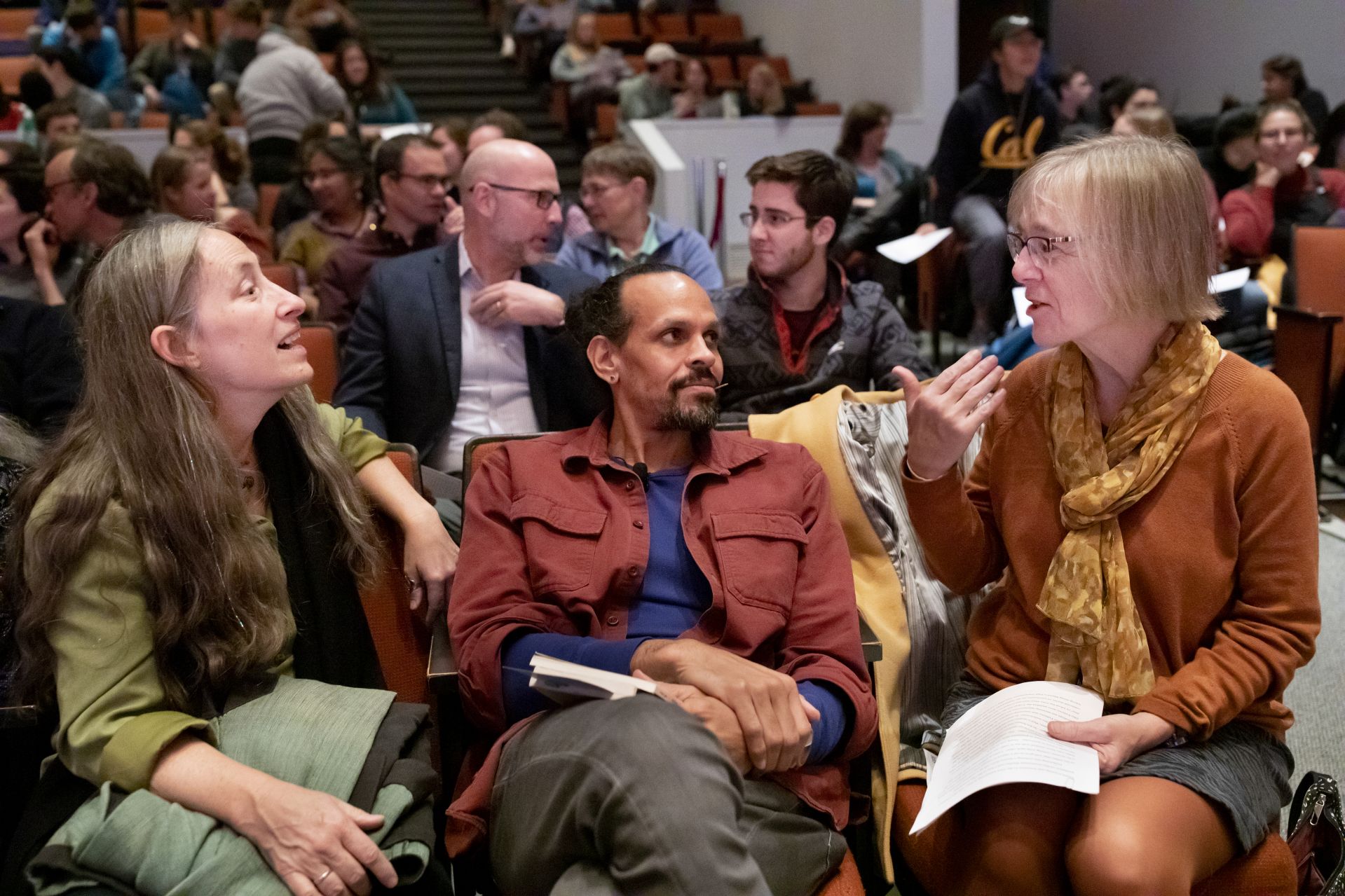
Professor of Religious Studies Cynthia Baker joins Ross Gay and Costlow before his Otis presentation in the Olin Arts Center Concert Hall. (Phyllis Graber Jensen/Bates College)
It’s an example of a service contribution that folds integrally into my teaching and my scholarship. Service contributions don’t always do that. This service was a huge benefit for my students and for my own thinking about literature and the environment. It’s nice when it feels like you’re all kind of heading in the same direction.
In what ways did you particularly enjoy this year’s lecture?
I don’t think I’ve ever laughed so much at an Otis Lecturer, as a lot of our speakers tend to bring us perspectives about difficult and dire situations in the world, whether it’s extinction or climate change or plastics in the Pacific Ocean, those really tough issues. And those have been wonderful contributions.
But what I felt from Ross was that he was reminding us what we love and treasure — why we care about particular places and possibilities in the first place. He also, somehow, created an experience of community in that place and short time.
It was like everybody there was really with him. Having that experience of being a kind of mini-community for the space of his performance was energizing and life-giving.
